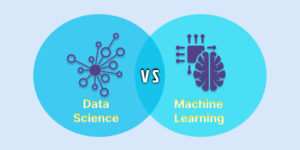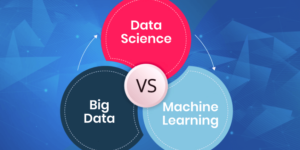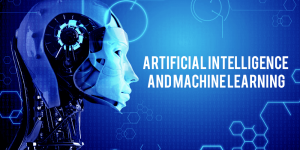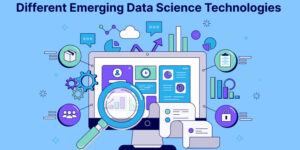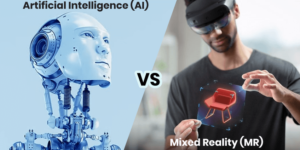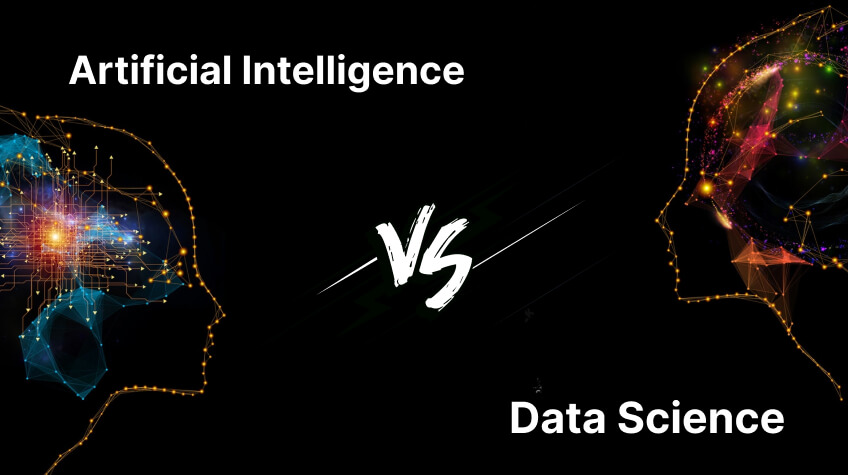
AI and Data Science are overlapping fields that have transformed how we function, exist, and communicate with technology. AI and Data Science both utilize data to gain insights and make predictions; however, their respective objectives, methods, and applications differ substantially. Artificial Intelligence, or AI, involves developing intelligent machines that complete jobs usually demanding human intellect – including natural language processing, computer vision analysis, and decision-making.
Data Science employs mathematical and statistical techniques to examine large volumes of data, searching for patterns and insights that can guide business decisions, scientific research, policy-making, and more. We will explore key differences between Artificial Intelligence and Data Science while noting their contributions to technology development.
What is Artificial Intelligence (AI)?
Artificial Intelligence (AI) is the simulation of human intelligence in machines programmed to perform tasks that typically require human cognition, such as learning, reasoning, and problem-solving—AI technologies range from machine learning and natural language processing to computer vision and robotics.
AI algorithms can also be trained to recognize patterns in data, make predictions and enhance performance over time; applications range from self-driving cars and virtual assistants all the way through healthcare and finance – AI technology holds enormous promise when it comes to revolutionizing industries as well as improving efficiency while enriching the quality of life!
How does Artificial Intelligence work?
Artificial Intelligence (AI) employs algorithms and mathematical models to explore large volumes of data and make projections or judgments based on it. Machine Learning, one subset of AI, uses algorithms to automatically learn patterns from data to improve forecasts over time. Natural Language Processing (NLP) allows machines to understand human speech, while Computer Vision interprets visual data for interpretation and analysis.
Applications of artificial intelligence range from simple decision-making tasks such as Netflix movie recommendations to complex applications like self-driving cars; its accuracy and effectiveness depend on the quality/quantity of data used when training the models compared with data used during their training session.
What is data science?
Data Science is an interdisciplinary field incorporating statistical analysis, machine learning, and domain expertise to pull details and insight from data sets. Data scientists use mathematical and statistical techniques to analyze and interpret large volumes of data, discovering patterns, trends, and relationships that can assist business decisions, scientific research projects, or policy creation.
Data Science encompasses multiple stages of data analysis, from collection, cleaning, exploration, visualization, and modeling. Data Science is rapidly expanding due to increasing data availability and its utilization by organizations to gain a competitive edge. Data can provide invaluable insight that leads to improved decision-making, efficiency gains, and innovation enhancement.
How Does Data Science Work?
Data science employs statistical and mathematical techniques to large amounts of data to draw insights and extract knowledge from it. This process typically entails several stages, including data collection, cleaning, exploration, and visualization modeling interpretation. Data scientists use programming languages such as Python and R to process, manipulate and visualize their data, while tools such as Tableau or Power BI help visualize insights and present insights to audiences.
Machine Learning algorithms can be used to automatically recognize patterns in data and make predictions, while deep learning techniques are used for more complex tasks like image and speech recognition. Data Science seeks to transform raw data into insights that can help inform business decisions, scientific research, and policy-making decisions.
Data Science Vs. Artificial Intelligence
Here are some critical dissimilarities between Data Science and Artificial Intelligence (AI):
Data Science:
- Focuses on extracting insights and knowledge from data.
- Involves statistical analysis, machine learning, and domain expertise.
- Involves data cleaning, exploration, visualization, modeling, and interpretation.
- Aspired to solve distinctive company issues.
- Uses programming languages like Python and R to analyze and manipulate data.
- Uses tools like Tableau and Power BI to visualize and present insights.
- Focuses on finding correlations and patterns in data.
- Can be used to predict results established on chronological data.
- Requires large volumes of data to produce accurate results.
Artificial Intelligence:
- Concerned with creating intelligent machines that can complete jobs that generally need human cognition.
- Involves technologies like machine learning, natural language processing, and computer vision.
- Involves creating algorithms that can learn from data and improve over time.
- Can be utilized for a broad spectrum of applications, from self-driving cars to healthcare.
- Requires large amounts of computational power to train AI models.
- Can be used to recognize patterns in data and make predictions, but also to interact with humans through natural language processing and computer vision.
- Focuses on creating machines that can complete jobs that are too complex or risky for humans.
- Can improve productivity and output in different enterprises.
Data Science’s Limits
Data science has revolutionized how organizations utilize data to make decisions. Yet, there can be downsides associated with its practice that must be considered when applying this field: Biased data can lead to biased results Privacy and Security Concerns affecting data analytics.
An increase in demand has created a shortage of qualified data scientists, leading to difficulty in communicating results to non-experts and limited ability to handle unstructured data, identify causation versus correlation issues, and predict rare events or phenomena, as well as high costs of implementation of data science solutions.
Data Science remains an indispensable tool for extracting insight and knowledge from data, with significant potential to enhance decision-making and innovation. While its limitations should not be underestimated, data science remains an invaluable method of uncovering these insights and knowledge from data.
Artificial Intelligence Limitations
Artificial Intelligence (AI) holds immense potential to revolutionize various industries. Yet, certain drawbacks must be considered before its implementation, including algorithm biases that could result in unfair decisions. Lack of transparency regarding decision-making is among these issues.
Potential replacement of human jobs by AI concerns surrounding its use for surveillance or military purposes.
Security concerns associated with AI systems exist as these can be vulnerable to hacking and cyber-attacks, necessitating ongoing research and development and collaboration among industry, government, and academia to ensure AI is used responsibly.
Which Is Better
It can be hard to determine the superior field since both Data Science and Artificial Intelligence (AI) serve critical and complementary purposes. Data Science involves extracting insights and knowledge from data, while AI attempts to create smart machines competent in completing jobs that generally need human cognition.

Both fields possess strengths and limitations; therefore, determining which is most suited to an organization or individual will depend on its goals and requirements. Data Science may be best used for extracting insights from large volumes of data, while AI would be necessary if your goal is creating a self-driving car. Both technologies hold tremendous potential to transform various industries and improve decision-making; their implementation requires thoughtful consideration of specific circumstances and goals.
Conclusion
While Data Science and Artificial Intelligence overlap somewhat, they remain distinct fields with distinct applications, tools, and techniques. Data Science focuses on extracting insights and knowledge from data, while AI attempts to make smart machines competent in completing jobs that generally need human cognitive ability.
Both fields offer their particular strengths and limitations, so selecting one over another depends on your organization’s or individual’s specific goals and needs.
Data Science and AI require careful consideration of each context and objective as well as ongoing research and development to address both challenges and opportunities presented by these dynamic fields. We hope this blog on the difference between artificial intelligence and data science is useful to readers.

